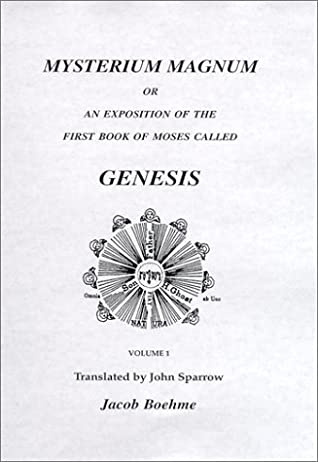

 |

|

The average rating for Mysterium Magnum or an Exposition of the First Book of Moses Called Genesis based on 2 reviews is 4 stars.
Review # 1 was written on 2009-12-05 00:00:00 Virginia Anderson Virginia AndersonCarpenter proposes that self-conciousness and fear led to the entire world pantheon of different faiths. "Naturally as soon as Man began to think about himself--a frail phantom and waif in the midst of tremendous forces of whose nature and mode of operation he was entirely ignorant--he was BESET with terrors...the natural defence against this state of mind was the creation of an enormous number of taboos...hardened down into very stringent Customs and Laws...avoidance not only of acts which might reasonably be considered dangerous, like touching a corpse, but also things much more remote and fanciful in their relation to danger, like merely...passing a lightning-struck tree; ... and acts which offered any special pleasure or temptation--like sex or marriage or the enjoyment of a meal. "...Fear does not seem a very worthy motive, but in the beginning it curbed the violence of the purely animal passions, and introduced order and restraint among them. ...(F)rom the early beginnings (in the Stone Age) of self-consciousness in Man there has been a gradual development--from crass superstition, senseless and accidental, to rudimentary observation, and so to belief in Magic; thence to Animism and personification of nature-powers in more or less human form, as earth-divinities or sky-gods or embodiments of the tribe; and to placation of these powers by rites like Sacrifice and the Eucharist, which in their turn became the foundation of Morality...; observations of plants or of the weather or the stars, carried on by tribal medicine-men for purposes of witchcraft or prophecy, supplied some of the material of Science; and humanity emerged by faltering and hesitating steps on the borderland of these finer perceptions and reasonings which are supposed to be characteristic of Civilisation." Carpenter goes on to compare Christian tenets with pagan practices around the world. You can see how fear of neverending winter, starvation, and death spurred belief in magic, ritual, animism, anthromomorphism, and today's conventional religions. In his British imperialistic furor to spread civilization, Carpenter also predicts the emergence of a "Common Life" beyond self-consciousness, blasting the selfish motives of capitalism and actually hailing the practices of early Christian communities and the movements of the Communists in eastern Europe. Granted, Carpenter's book was first published in 1920, just after WWI, before we could see Communism fall, and before Ayn Rand could inspire anyone to Constructivism. But Carpenter's view of religious history is useful. It certainly predates Campell's Hero of a Thousand Faces but has similar depth and scope. I recommend this book along with: * Joan O'Grady's "Early Christian Heresies" which examines the philosophies and turning points that molded Christian tenets during its birth and growth so that it could promise salvation to the masses. The scope includes Gnosticism, Marcionites, Montanists, Manichaeism, Donatists, Arianism, Nestorians, Pelagius, and more. * Erik Davis' "Techgnosis: myth, magic + mysticism in the age of information" which proposes that forms of communication shape social and individual consciousness of reality. "It follows that when a culture's technical structure of communication mutates quickly and significantly, both social and individual 'reality' are in for a bit of a ride. ...The social imagination leaps into the breach, unleashing a torrent of speculation, at once cultural, metaphysical, technical, and financial." |
Review # 2 was written on 2011-01-28 00:00:00 Jane Scifleet Jane ScifleetThis is a fascinating book, though written in a somewhat archaic style. I recommend this to those who are willing to examine the history of religion with an open mind. If you think Christianity sprang out of thin air, with no influence from earlier religions, and wish to keep thinking that, this is probably not the book for you. |
CAN'T FIND WHAT YOU'RE LOOKING FOR? CLICK HERE!!!